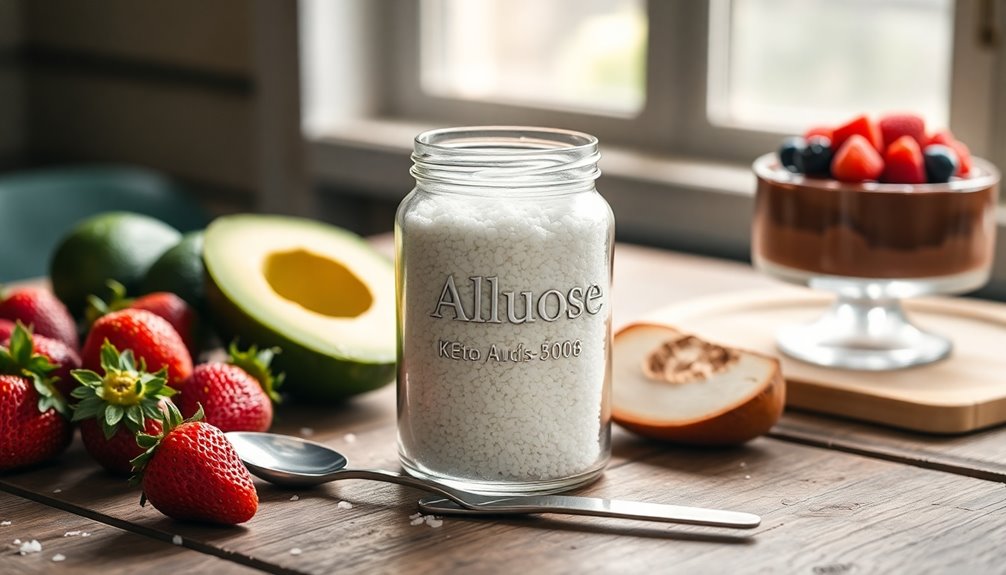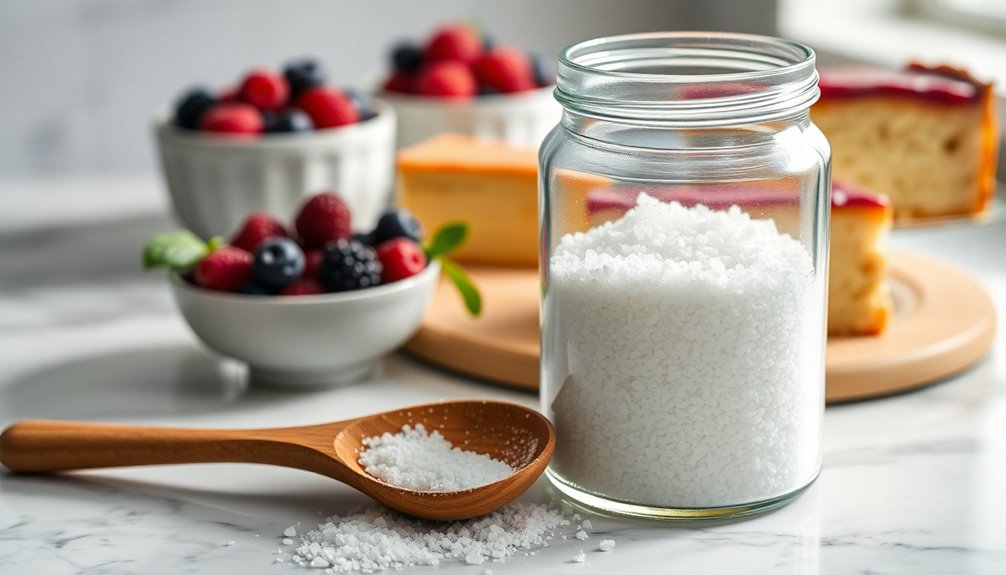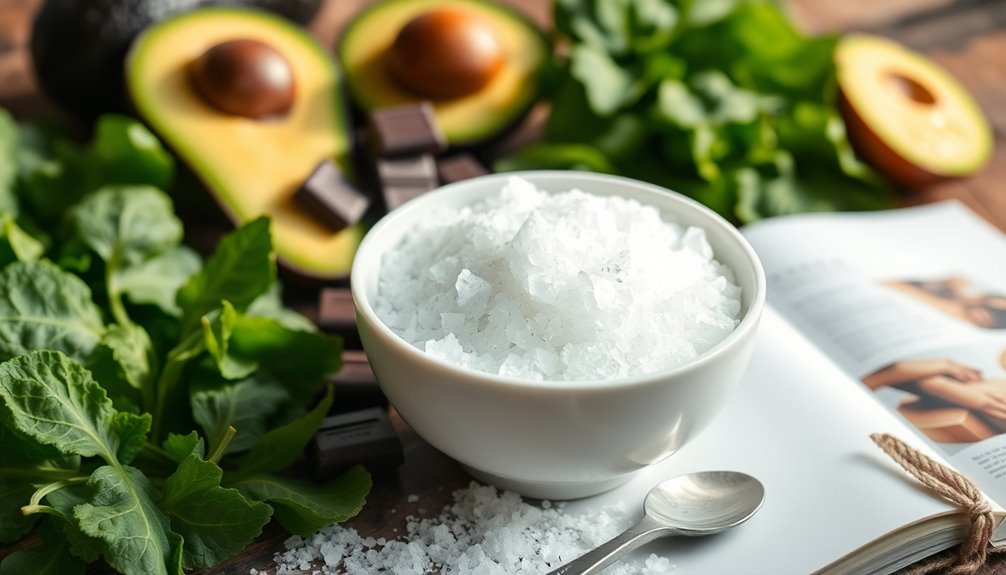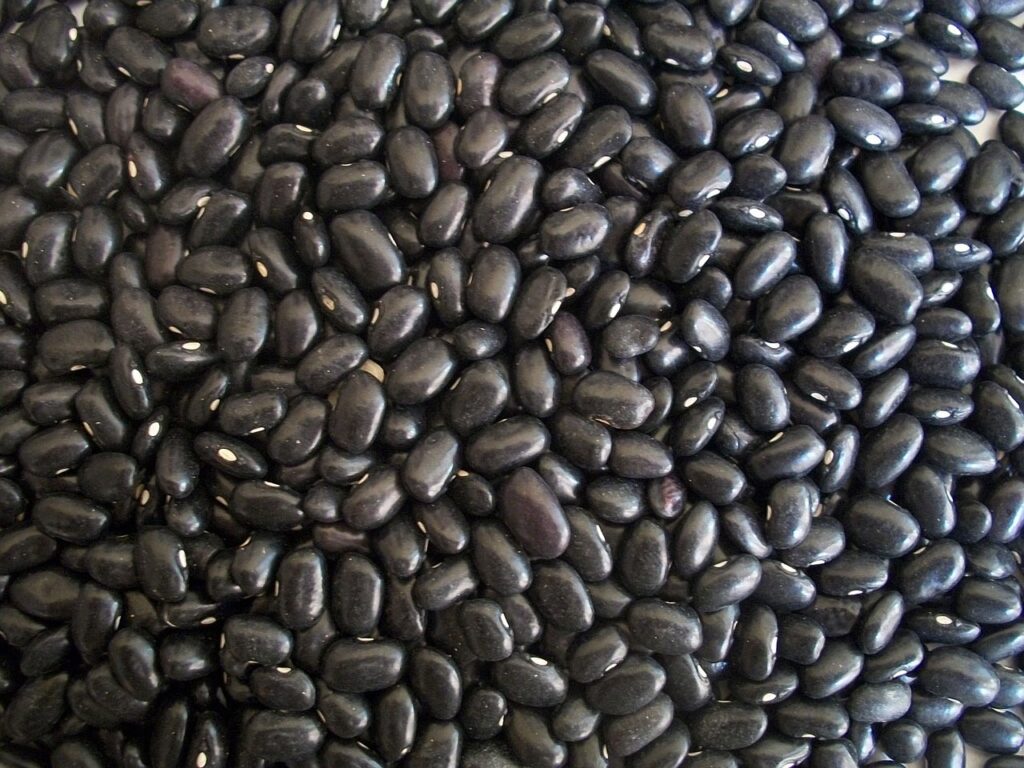Allulose is a low-calorie sweetener that works great in your keto diet. It has zero calories and a glycemic index of zero, so it won't spike your blood sugar or insulin levels. This means you can enjoy sweetness without worrying about carbs, making it perfect for maintaining ketosis. You'll find it easier to satiate sweet cravings while staying aligned with your low-carb goals. Plus, it can be used in a variety of recipes, adding delicious flavor without the guilt. If you're curious about its benefits and how to use it, there's plenty more to explore.
Overview of Allulose
Allulose, a unique low-calorie sweetener, has gained attention for its potential benefits in various diets, particularly ketogenic ones. This naturally occurring monosaccharide is found in fruits like figs and jackfruit and provides only 0.2 to 0.4 calories per gram. It has been shown to assist in weight loss due to its low-calorie content and minimal effect on blood sugar levels. Additionally, allulose offers a similar taste and texture to sugar, making it an excellent option for keto-friendly recipes.
It's about 70% as sweet as sucrose, yet it's metabolized differently, being absorbed in the small intestine and mostly excreted, so it doesn't contribute to blood sugar levels. The FDA recognizes allulose as Generally Recognized as Safe (GRAS), and it's not counted as an added sugar for labeling.
You can enjoy allulose in a variety of culinary applications, including baking, thanks to its ability to mimic sugar's taste and texture without raising insulin levels. Additionally, allulose has a low glycemic index, similar to other low-carb sweeteners, making it a suitable choice for those following a keto diet.
Allulose and the Keto Diet
If you're on a keto diet, allulose is a game-changer for satisfying your sweet tooth without the carbs. It won't spike your blood sugar or insulin levels, making it a smart choice for maintaining metabolic health. Additionally, allulose is a sugar substitute that provides sweetness without adding carbohydrates, which is crucial for maintaining ketosis. Plus, with a few recipe substitution tips, you can easily incorporate it into your favorite low-carb treats. Additionally, allulose helps promote improved insulin sensitivity, which is essential for effective blood sugar management. This is particularly beneficial for those following a ketogenic diet, as stabilized blood sugar levels are vital for overall health and weight loss.
Keto-Friendly Sweetener Benefits
When it comes to sweetening your meals on a keto diet, allulose stands out as a top choice due to its low-calorie content and minimal impact on blood sugar levels.
Here are a few reasons why you might want to contemplate allulose as your go-to sugar substitute:
- Low-Calorie: With only 0.2–0.4 calories per gram, allulose helps keep your caloric intake in check.
- Zero Glycemic Index: It won't spike your blood sugar or insulin levels, making it ideal for maintaining ketosis.
- Supports Metabolic Health: Studies suggest it may improve insulin sensitivity, aligning with your keto diet goals.
Blood Sugar Regulation
While steering through the challenges of a keto diet, maintaining stable blood sugar levels is essential for your overall success.
Allulose, a low-calorie sweetener with a glycemic index of zero, won't raise your blood sugar or insulin levels, making it perfect for your needs.
Studies show that incorporating allulose can lead to a 10% reduction in blood glucose levels after carbohydrate meals, enhancing your ability to manage cravings.
Since it's absorbed in the small intestine but not metabolized, about 70-80% is excreted without impacting your blood sugar.
This sweetener also improves insulin sensitivity, allowing you to enjoy desserts and treats while adhering to your low-carb dietary goals and supporting your metabolic state.
Recipe Substitution Tips
Maintaining stable blood sugar levels is key to your keto success, and finding suitable substitutes for sugar can make this journey easier.
Allulose, a fantastic keto-friendly sweetener, offers several health benefits while keeping your recipes low calorie. Here are some tips for substituting allulose in your recipes:
- Use about 30% more allulose to match the sweetness of regular sugar in baking.
- For ice creams and frozen desserts, allulose prevents ice crystals, resulting in a smooth texture.
- In savory dishes like sauces, allulose balances flavors without affecting blood sugar levels.
With allulose, you can enjoy delicious baked goods and flavorful meals without the guilt of traditional sugar.
Embrace this versatile sugar substitute in your keto journey!
Health Benefits of Allulose

Allulose offers significant benefits for managing blood sugar levels, which can be essential if you're on a keto diet. Its low caloric content helps with weight loss by providing sweetness without the extra calories. Plus, it may curb cravings for high-calorie treats, making it easier for you to stick to healthier eating habits. Additionally, stable blood sugar levels minimize energy crashes and may improve overall metabolic health. Furthermore, its ability to reduce hunger hormones mirrors one of the key mechanisms of the ketogenic diet, promoting sustained feelings of fullness. The reduced reliance on glucose when using allulose aligns well with the principles of the keto diet, supporting overall blood sugar regulation.
Blood Sugar Management
When managing blood sugar levels, choosing the right sweeteners can make a significant difference.
Allulose stands out due to its unique properties that support health and blood sugar management.
Here are some key benefits:
- Zero Glycemic Index: Allulose won't raise your blood sugar or insulin levels.
- Lower Blood Sugar Response: Clinical studies show it can reduce blood sugar spikes by up to 10% during carb-rich meals.
- Improved Insulin Sensitivity: Regular consumption may enhance insulin sensitivity, which is essential for those at risk of diabetes.
Weight Loss Support
If you're looking to shed some pounds, incorporating allulose into your diet can be a game changer. With only 0.2 to 0.4 calories per gram, allulose helps lower your overall caloric intake, supporting weight loss efforts.
Clinical studies show that it improves insulin sensitivity and blood sugar regulation, which can reduce fat storage. Additionally, allulose may enhance fat oxidation, boosting your fat-burning potential during metabolism.
By including allulose in your meals, you can also curb cravings for high-calorie sweets, making it easier to stick to a calorie-restricted or ketogenic diet.
A meta-analysis even revealed that allulose can lower post-meal blood sugar levels by about 10%, contributing to better metabolic health and weight loss outcomes.
Side Effects and Considerations
While many people enjoy the benefits of allulose, it's important to be aware of potential side effects and considerations. Allulose is generally recognized as safe, but high doses can lead to gastrointestinal symptoms.
Here are some key points to keep in mind:
- Moderation is key: Start with small amounts to gauge your tolerance. The maximum single dose is 0.18 grams per pound of body weight.
- Daily intake limits: For a 150-pound person, the safe upper limit is about 61 grams daily. Additionally, it's important to consider how carbohydrate content can affect your overall dietary goals on a keto diet. This is particularly relevant because improved insulin sensitivity can enhance your body's ability to manage carbohydrates more effectively.
- Consult a professional: If you have digestive disorders or sensitivities, it's wise to discuss allulose with a healthcare provider for tailored advice.
Additionally, being aware of your overall dietary fiber intake can help mitigate gastrointestinal issues that may arise from consuming allulose.
Being mindful of these considerations can help you enjoy allulose while minimizing potential health effects.
Culinary Uses of Allulose

Allulose opens up a world of culinary possibilities, allowing you to enjoy sweet flavors without the extra calories. This versatile sweetener can replace sugar in your favorite recipes, providing 0.2 to 0.4 calories per gram. When baking, allulose browns faster than sugar, making it perfect for creating caramelized desserts while using lower oven temperatures. You can whip up delicious low-carb desserts like ice creams and muffins with ease. Allulose can also be used in recipes for sugar-free keto desserts, enhancing the sweetness without compromising your dietary goals. Additionally, it works wonderfully in keto chocolate desserts, allowing you to indulge in rich flavors without the guilt. Many of these desserts can include decadent chocolate options, adding to the overall enjoyment of your treats.
Allulose also dissolves well in beverages, so you can make invigorating syrups without adding carbs. Just remember to use about 30% more allulose than sugar to match its unique sweetness profile.
With allulose, your low-carb cooking and baking adventures are bound to be even sweeter!
Allulose vs. Other Sweeteners
When choosing a sweetener for your keto lifestyle, you'll find that allulose stands out among the options available.
Here's how it compares to other sweeteners:
- Glycemic Index: Allulose has a glycemic index of zero, meaning it won't raise your blood sugar or insulin levels, unlike traditional sugars and high fructose corn syrup.
- Calories: With about 90% of its calories excreted without metabolism, allulose is lower in calories compared to sugar alcohols like erythritol, which can cause digestive issues for some.
- Taste Profile: While allulose is about 70% as sweet as sugar and offers a sugar-like taste, other sweeteners like stevia or monk fruit may have distinct flavors or aftertastes that differ from allulose.
Tips for Using Allulose

If you're looking to incorporate allulose into your cooking or baking, there are a few key tips to keep in mind.
First, when substituting allulose for sugar in your recipes, use about 30% more to achieve the same sweetness since it's about 70% as sweet.
In baking, remember that allulose browns faster, so consider lowering your oven temperature or reducing baking time.
Its versatility makes it perfect for sweetening beverages, syrups, and low-carb desserts.
However, start with small amounts to assess your tolerance, as higher doses may cause gastrointestinal discomfort like bloating.
You can find allulose in granulated, powdered, and liquid forms, making it easy to experiment in various recipes.
Enjoy your low-carb creations!
Conclusion
Incorporating allulose into your keto journey can feel like finding a hidden gem in a vast treasure chest. With its low-calorie count and minimal impact on blood sugar, it's a sweet alternative that aligns perfectly with your dietary goals. While it boasts several health benefits, staying mindful of potential side effects is key. Embrace allulose in your culinary adventures, and enjoy the sweetness without guilt as you navigate your keto lifestyle with ease.







